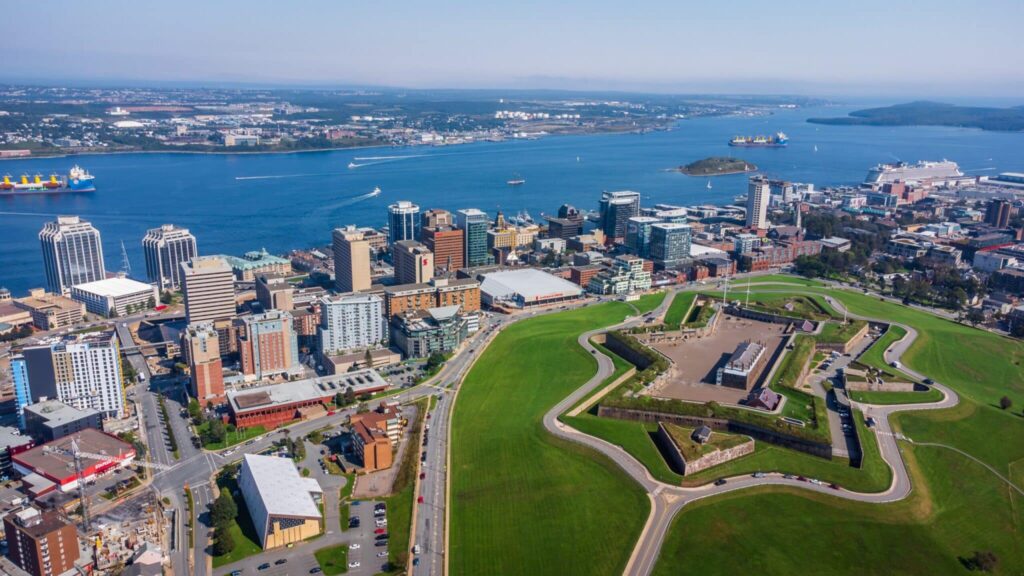In the ever-evolving tapestry of global business, Canada emerges as a centre of entrepreneurial spirit and innovation. As we have started navigating 2025 with some caution, we should look at the country’s cities that are not just dots on a map but vibrant hubs where ideas flourish and businesses thrive.
For startups and entrepreneurs, choosing a city is a critical decision to shape their venture’s future, and they should pay attention to Canadian cities. This article goes through the Canadian urban landscapes that have distinguished themselves as the best cities for business, innovation and entrepreneurship. With all the ups and downs, Canada offers a fertile ground and fascinating cities for startups and entrepreneurs to plant and grow their seeds of innovation.
Why Canada is a Great Destination for Business
Canada stands out as a premier business destination due to its diverse economy, highly skilled workforce, and favorable business environment. The country boasts a strong reputation for innovation, supported by numerous world-class universities and research institutions that drive cutting-edge research and development. Entrepreneurs and investors are drawn to Canada by its business-friendly policies, which include competitive tax rates and a streamlined regulatory framework designed to foster growth and innovation.
Moreover, Canada’s commitment to inclusivity and diversity creates a welcoming environment for businesses from all backgrounds. The country’s strategic location, robust infrastructure, and access to international markets further enhance its appeal as a business hub. Whether you’re a startup looking to scale or an established company seeking new opportunities, Canada offers a fertile ground for business success.
Factors That Make a City Ideal for Business in Canada
The quest for the perfect city in Canada to launch and grow a business is akin to finding a fertile oasis in a desert. It requires a harmonious blend of resources, opportunities, and a conducive environment.
The ideal business city boasts a robust economic infrastructure, a regulatory framework that champions entrepreneurship, and a culture that fosters innovation. Access to capital is the lifeblood of startups, and cities that offer many funding avenues, from angel investors to venture capitalists, stand out. Also, a big city whose workforce is its engine; hence, proximity to top-tier universities and a culture of continuous learning contribute to a dynamic talent pool, both local and acquired, by attracting an international student body.
Market access is another cornerstone, with connectivity to national and international markets being a catalyst for growth. The cost of living and quality of life must be considered, as they directly impact the ability to attract and retain the best minds. These factors, when woven together, create the fabric of a city that not only welcomes business but propels it to new heights.
With those pointers in mind, let’s look at relevant Canadian cities individually.
Work-Life Balance: A Key Consideration
When choosing the best city to live in Canada, work-life balance is a crucial aspect to consider. Canadian cities like Quebec City and Vancouver offer an exceptional balance between work and leisure activities, making them attractive destinations for entrepreneurs and professionals alike.
Quebec City, with its rich history and picturesque setting along the Saint Lawrence River, provides a unique blend of old-world charm and modern amenities. The city’s vibrant cultural scene, including numerous festivals and events, ensures that there is always something to do outside of work hours. Additionally, Quebec City’s compact size means shorter commute times, allowing residents more time to enjoy their surroundings.
Vancouver, located in British Columbia, is renowned for its stunning natural beauty and outdoor recreational opportunities. The city’s proximity to mountains, forests, and the Pacific Ocean offers endless possibilities for hiking, skiing, and water sports. Vancouver’s mild climate and diverse population contribute to a high quality of life, making it a top choice for those seeking a balanced lifestyle.
Toronto and Montreal, two of Canada’s largest cities, also excel in providing a rich cultural experience. Toronto is home to the Royal Ontario Museum, one of the largest museums in North America, offering a vast array of exhibits and educational programs. Montreal, known for its vibrant arts scene, hosts numerous festivals throughout the year, including the world-famous Montreal International Jazz Festival. Both cities offer a plethora of dining, entertainment, and cultural attractions, ensuring a dynamic and fulfilling lifestyle.
The capital city of Ottawa is another excellent example of work-life balance. With its numerous parks, bike paths, and cultural institutions like the Canadian War Museum, Ottawa offers plenty of opportunities for outdoor activities and cultural enrichment. The city’s relatively low cost of living and high quality of life make it an attractive destination for professionals and families.
In British Columbia, cities like Victoria offer a more relaxed pace of life. Victoria’s beautiful landscapes, including Beacon Hill Park and the Royal BC Museum, provide ample opportunities for leisure and exploration. The city’s mild climate and easy access to outdoor activities make it a haven for those seeking a balanced lifestyle.
Prince Edward Island is also a popular destination for those seeking a better work-life balance. Known for its picturesque landscapes and relaxed atmosphere, the island offers a peaceful retreat from the hustle and bustle of city life. The island’s strong sense of community and slower pace make it an ideal place for those looking to prioritize their well-being.
Tourist attractions like Heritage Park Historical Village in Calgary and the Royal BC Museum in Victoria are not only great places to visit but also contribute to the cultural richness of these cities. These attractions provide residents with opportunities to learn about Canadian history and culture, enhancing their overall quality of life.
When choosing the best city to live in Canada, it’s essential to consider the work-life balance and how it aligns with your personal preferences and priorities. By considering factors like commute time, access to outdoor activities, and cultural attractions, you can find a city in Canada that offers the perfect balance between work and leisure.
Top Cities in Canada for Business, Startups & Entrepreneurs in 2025
Below is a list of top cities for business in Canada: Toronto, Canada’s largest city, is renowned for its vibrant culture, job opportunities, and diverse neighborhoods, making it a major hub for tourism and entertainment.
1 – Toronto: The Economic Powerhouse

Toronto is Canada’s economic powerhouse and its largest city, where startups and entrepreneurs are greeted with a wealth of resources and opportunities. The city’s Small Business Enterprise Centres offer personalized guidance from seasoned advisors, helping new businesses navigate the startup complexities.
With a step-by-step guide tailored to Toronto’s unique business landscape, entrepreneurs can access vital information on funding, business regulations, licenses, and permits. The city’s commitment to fostering a thriving startup ecosystem is evident through its support for accelerators, incubators, and coworking spaces, connecting entrepreneurs with the mentors and networks they need to succeed. Toronto’s robust tech scene, fueled by initiatives like StartUp Here, underscores its reputation as a leading center for innovation and growth.
Government-supported organizations, such as Toronto Global, Invest Ontario and many other city, regional and area-specific initiatives, and private sector service providers like Sobirovs Law Firm, are ready to support any entrepreneur’s journey to the Greater Toronto Area.
2 – Vancouver: The Gateway to the Pacific

Vancouver’s picturesque setting in British Columbia and strategic Pacific Rim location make it an attractive destination for businesses with global ambitions. The city’s tech industry is booming, supported by a strong network of investors and a culture that champions sustainability and innovation. Vancouver’s startup ecosystem is rich with resources, including various incubators and accelerators that provide the support and mentorship necessary for businesses to scale. Its ecosystem is said to be the second-best startup ecosystem in Canada, the 18th in North America and the 30th globally. The city’s quality of life, diverse population, and connectivity offer a competitive edge, making it a top choice for entrepreneurs looking to tap into international markets.
3 – Montreal: The Cultural Innovator

Montreal’s vibrant culture and burgeoning artificial intelligence sector have positioned it as a standout Canadian city and a hub of innovation. The city’s cost-effective business environment, coupled with a multilingual workforce, makes it an ideal location for startups looking to leverage a diverse and creative talent pool. Montreal’s R&D initiatives and collaborative spaces foster a spirit of innovation, while its cultural richness and quality of life attract entrepreneurs from around the globe.
4 – Calgary: The New Frontier for Clean Tech

Calgary is reinventing itself as a new frontier for clean tech and innovation. Calgary is also home to the Heritage Park Historical Village, where visitors can experience pioneer life and the city’s agricultural and ranching heritage. With its entrepreneurial spirit and a history rooted in the energy sector, the city is pivoting towards sustainable practices and technologies. Calgary’s economic strategy includes significant support for startups, focusing on diversifying the local economy and fostering an environment where new business ventures can thrive. The city’s quality of life, competitive business costs, and proactive approach to innovation make it a promising destination for startups, particularly those in the clean tech sector.
5 – Ottawa: The Unsung Hero of Tech Innovation

Ottawa’s highly educated workforce and focus on research and development have quietly established it as a powerhouse for tech firms. Ottawa is also home to the Canadian War Museum, which delves into the history of Canada’s military and significant events that have shaped the nation. Additionally, the Canadian Aviation and Space Museum stands out as a key feature of the city, highlighting Ottawa’s cultural and educational attractions. The capital city’s innovation centers and tech parks provide a collaborative environment for startups to connect with like-minded businesses and academic institutions. Ottawa’s government support for technology initiatives and its growing reputation as a telecommunications and software development leader offer unique advantages for startups looking to disrupt the tech industry.
6 – Quebec City: A Historic Hub for Modern Business

Quebec City is a historic hub for modern business, seamlessly blending old-world charm with cutting-edge innovation. This picturesque city, nestled along the Saint Lawrence River, is home to a thriving tech industry, with numerous startups and established companies excelling in fields such as artificial intelligence, cybersecurity, and clean technology. Quebec City’s business-friendly environment, characterized by competitive tax rates and a highly skilled workforce, makes it an attractive location for entrepreneurs and investors alike.
The city’s unique cultural heritage, combined with its modern amenities, provides a vibrant backdrop for business activities. Quebec City’s commitment to fostering innovation is evident through its support for research and development initiatives, collaborative workspaces, and a strong network of industry professionals. For those looking to establish or grow their business in a dynamic and supportive environment, Quebec City offers a compelling blend of tradition and modernity.
Emerging Cities: The Rising Stars Including Quebec City
Beyond the well-known hubs, emerging cities across Canada are making their mark as rising stars for business. These cities offer attractive incentives, specialized industries, and a community-focused approach to supporting startups. With lower living costs and unique regional advantages, these up-and-coming destinations prove that innovation can flourish outside of the traditional urban centers.
Considering all the above, one should also explore rising star cities such as Halifax in Nova Scotia, Edmonton in Alberta, Kingston in Ontario, and Charlottetown in Prince Edward Island. Halifax, for example, is home to the Canadian Museum of Immigration, which plays a significant role in the city’s cultural landscape by showcasing unique exhibits on the history of immigration in Canada. Edmonton, for instance, is home to Elk Island National Park, a destination for nature enthusiasts and families.
Quality of Life and Cost of Living in Canadian Cities

Canada is renowned for its high quality of life, with many cities offering an excellent balance of work and leisure. The cost of living varies across Canadian cities, but many offer a relatively low cost of living compared to other developed countries. Here are some examples of the quality of life and cost of living in some of Canada’s major cities:
-
Toronto: As Canada’s largest city, Toronto offers a high quality of life with a plethora of cultural attractions, restaurants, and entertainment options. However, the cost of living is relatively high, with the average rent for a one-bedroom apartment around $2,000 per month. The city’s vibrant arts scene, diverse population, and proximity to Lake Ontario make it a dynamic place to live and work.
-
Vancouver: Known for its stunning natural beauty and outdoor recreational opportunities, Vancouver is a popular city on the west coast of Canada. The cost of living is relatively high, with the average rent for a one-bedroom apartment around $2,500 per month. Despite the higher costs, Vancouver’s quality of life is enhanced by its mild climate, scenic landscapes, and strong sense of community.
-
Montreal: This historic city in Quebec is celebrated for its vibrant arts and culture scene. The cost of living in Montreal is relatively low, with the average rent for a one-bedroom apartment around $1,500 per month. Montreal’s rich cultural heritage, diverse culinary offerings, and lively festivals contribute to its reputation as a great place to live and work.
-
Calgary: Located in Alberta, Calgary is known for its strong economy and high standard of living. The cost of living is relatively high, with the average rent for a one-bedroom apartment around $1,800 per month. Calgary’s proximity to the Rocky Mountains, combined with its thriving business environment, makes it an attractive destination for both work and play. Additionally, Fish Creek Provincial Park offers extensive outdoor recreational opportunities, enhancing the quality of life for residents.
Access to Funding and Resources

Canada offers a wealth of funding and resources for businesses, ensuring that entrepreneurs have the support they need to succeed. The country provides a range of government programs and initiatives, venture capital, and angel investors, all designed to foster business growth and innovation. Here are some examples of the funding and resources available to businesses in Canada:
-
Government Programs and Initiatives: The Canadian government offers numerous programs to support businesses, including the Small Business Financing Program, the Canada Small Business Financing Program, and the Business Development Bank of Canada. These programs provide essential financing and advisory services to help businesses grow and thrive.
-
Venture Capital: Canada has a robust venture capital industry, with many firms investing in startups and early-stage companies. Top venture capital firms in Canada include OMERS Ventures, Georgian Partners, and Real Ventures, all of which provide critical funding and mentorship to help businesses scale.
-
Angel Investors: The country boasts a large and active angel investor community, with many individuals investing in startups and early-stage companies. Prominent angel investor groups in Canada include the National Angel Capital Organization and the Canadian Angel Investment Network, both of which offer valuable support and resources to budding entrepreneurs.
Government Programs and Initiatives
The Canadian government is committed to supporting businesses through a variety of programs and initiatives, including:
-
The Small Business Financing Program: This program provides financing to small businesses, including loans and guarantees, to help them grow and succeed.
-
The Canada Small Business Financing Program: Similar to the Small Business Financing Program, this initiative offers loans and guarantees to support small businesses in their growth efforts.
-
The Business Development Bank of Canada (BDC): The BDC provides financing and advisory services to small and medium-sized businesses, helping them navigate the challenges of growth and development.
-
The Canadian Trade Commissioner Service: This service offers support to businesses looking to export their products and services, providing valuable market insights and connections.
-
The National Research Council of Canada (NRC): The NRC provides funding and support to businesses looking to develop new technologies and products, fostering innovation and competitiveness in the Canadian market.
By leveraging these programs and initiatives, businesses in Canada can access the resources and support they need to thrive in a competitive global market.
Entrepreneurship and Business Immigration

Canada’s entrepreneurial landscape is as diverse as it is welcoming, with a structured pathway for those looking to start their business ventures within its borders. The government outlines clear steps for starting a business, which include assessing readiness, choosing a business structure, conducting market research, and writing a business plan. A notable aspect of Canada’s business environment is its support for immigrant entrepreneurs, evident through programs like the Immigrant Startup Visa. This program is designed to attract entrepreneurs worldwide with innovative, scalable and investable ideas. It allows them to establish their businesses in Canada, contributing to economic diversity and innovation.
Registering a business is streamlined, with resources available for each step—from selecting and registering a business name to understanding and applying for the necessary permits and licenses. The government also provides specialized support and financing options, including those for immigrant and aboriginal entrepreneurs, ensuring a supportive environment.
Moreover, Canada’s commitment to business support extends to tax assistance, with free tax help available to ensure businesses can maximize their financial efficiency and compliance. This comprehensive support system not only aids in a company’s initial setup but also provides a foundation for sustained growth and success.
Canada’s embrace of entrepreneurship and business immigration reflects its recognition of the value that diverse business owners bring to the economy. By providing a welcoming and supportive environment, Canada is a leading destination for business innovation and growth.
Success Stories: Startups That Thrived in Canadian Cities
Canada’s startup scene is not just alive; it’s thriving with success stories that underscore its status as a fertile ground for innovation. Entrepreneur First, a global talent investor, has been instrumental in transforming Canada’s vast talent pool into successful founders since its launch in the country. The Toronto-based program has fostered over 25 venture-backed companies by connecting individuals with a global network of advisors and investors and, most importantly, with the right co-founders.
One such success is Vivid Machines, a startup that has revolutionized the fruit supply chain by digitizing on-farm fruit production with innovative spectral sensors and real-time computer vision. This technology enables farmers to manage growth and predict yield, providing early diagnosis of pests, diseases, and nutrient deficiencies. Another standout is Glowstick, a platform that empowers customer success teams with AI-driven insights, surfacing growth opportunities and retention risks in customer conversations.
Metacommerce, an all-in-one app-based platform, provides no-code tools for launching and managing NFT experiences, catering to the burgeoning web3 and ownership economy. Sequestr, a global marketplace for carbon financing, aligns corporate buyers with working capital for farmers, landowners, and project developers to reduce and remove emissions. Lastly, UpBeing measures emotion using behavioural data to improve the human experience, automating the measurement and improvement of habits to enhance mental health.
These companies, born from the synergy of talent and opportunity, exemplify the entrepreneurial spirit that courses through Canada’s cities. They are not just businesses but great examples of innovation, showcasing the potential that lies within the nation’s supportive ecosystem for startups.

The Decision Is Yours

As we think about the best cities in Canada for business, startups and entrepreneurs in 2024, it’s clear that the nation offers many opportunities across its vast territory. From the bustling economic corridors of Toronto to the innovative tech landscapes and beautiful city of Vancouver, the cultural richness of Montreal, the clean tech frontiers of Calgary, and the tech innovation hubs of Ottawa, Canada presents diverse environments conducive to business growth.
The success stories of startups that have flourished in these cities prove the supportive ecosystem Canada has meticulously cultivated. These narratives of achievement inspire and serve as a blueprint for aspiring entrepreneurs looking to carve out their success stories in the Canadian (and North American) business realm.
In conclusion, Canada’s cities are not just physical locations but incubators of dreams and ambitions. They offer a blend of resources, talent, and innovation-friendly policies that make them ideal for startups and entrepreneurs. As 2024 unfolds, these cities are poised to continue their legacy of being the best places for business in Canada, fostering an environment where entrepreneurs worldwide can thrive and contribute to a dynamic and prosperous economy.
Frequently Asked Questions
Below, you will find answers to the most commonly asked questions about this topic.
Is Canada a good place to start a business?
Canada is recognized as one of the top countries in the world for starting a business. The straightforward process can be completed in as few as five days. The nation’s supportive regulatory environment and strong focus on innovation make it an attractive destination for entrepreneurs.
Do I need to be a Canadian resident to start a business in Canada?
Starting a federal corporation in Canada typically requires being a Canadian citizen or a landed immigrant. However, non-residents can create and use provincial corporations to start a business without needing to be Canadian residents.
What are the requirements for registering a business in Canada?
Not all businesses require registration. If you operate a sole proprietorship under your legal name, you may not need to register provincially, though municipal registration might still be necessary. It’s important to note that registering a business name does not provide complete name protection, which varies depending on the business structure.
What are the financing options for new businesses in Canada?
Most Canadian small businesses are self-financed, with many starting with less than $5,000. While outright grants are rare, the Canadian government offers various financing programs, and specific loans are available through government-sponsored and non-profit agencies and private investor groups.
How does the Canadian tax system support small businesses?
Canadian small business owners can reclaim GST/HST paid on business expenses, and businesses making less than $30,000 annually may qualify for Small Supplier status, exempting them from having to charge and remit GST/HST. Additionally, various tax credits and deductions are available, including those for scientific research and experimental development.
What is key to a small business’s success in Canada?
A sound business plan is crucial for success. Many small businesses fail due to poor planning, so investing time and resources into a comprehensive business plan is essential for ensuring the viability and growth of a new venture.
Related Articles:
- Employer’s Tech Immigration Guide: Canada Tech Visa
- Choosing the Best Canada Immigration Lawyer: The Complete Guide For Immigrants
- Entrepreneur Programs of the Canadian Provinces
- PNP Canada: Provincial Nominee Programs – All You Need to Know
- How To Start A Business in Canada From India in 2024: Immigration Options and Successful Cases
- How a Business Plan Led to Canadian Immigration Success
- Summer of Success at Sobirovs – 25 Application Approvals
- Navigating Canadian Immigration: A Success Story for Arts Professionals
- Alberta Business Success Stories: A Vietnamese Business Woman Finds Success
- How an Entrepreneur Secured AAIP Rural Entrepreneur Work Permit After Business Closure
- Immigration From Beijing to Alberta: A Success Story of Perseverance and Vision
















